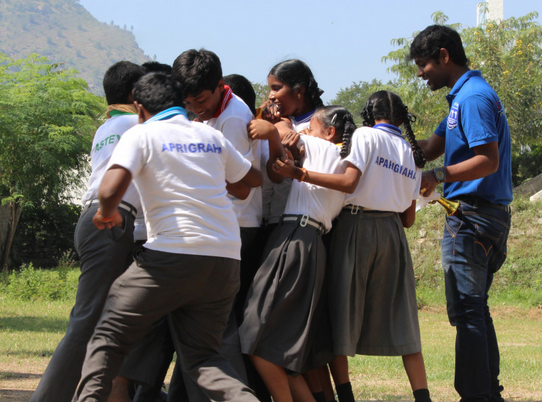Abhik Sen and Rafiullah Kakar believe that the world has a window of opportunity. The editors of the Commonwealth Secretariat’s 2016 Global Youth Development Index (YDI) wrote about it in The Guardian newspaper. Launched in 2013, the updated YDI has been commended as a tool for helping policy-makers.
Sen and Kakar say the “youth bulge” over the next few decades – that is, the significant number of young people in a country’s population – could be a blessing for many countries. But only, they added, if “governments and others do what is necessary to ensure young people become healthy, educated and productive citizens”.
In order to do that, though, they need data to help them develop more evidence-based policies and programmes. The 2016 YDI gives them that information. It “aggregates data on 18 indicators related to the health, education, employment and political participation levels of young people, provides a snapshot of the multi-dimensional nature of youth development in 183 countries”.
Only by acting on the findings thrown up by the index will countries make the most of the demographic opportunity offered by today’s youth population, they say. “In much of the world, the window of opportunity for converting the youth bulge into a ‘demographic dividend’ will remain open for another few decades at best.”
Watch: Experts talk about the need to measure the status of young people in order to formulate better policy. A Commonwealth Secretariat report led to the creation of a youth development index. Its lead author, Abhik Sen, is among those interviewed
The index shows that:
- the top ten countries, with the exception of Australia and Japan, are from Europe
- the ten lowest-ranked countries are all from Sub-Saharan Africa; however, this region also recorded the largest improvement in the last five years
- youth unemployment is a spectre that looms as threateningly in developed countries as in the developing world, with young people at least twice as likely as adults to be jobless
- young women are much less likely to enjoy access to education, health services, financial services and digital technology than young men
- participation in formal politics is declining, underscoring growing frustration amid unmet aspirations, although digital activism, protests and volunteering are growing
- young people suffer disproportionately from violent crime, as seen with the spike in extremism; however, they also play an active role in peace-building.
The YDI is an admirable effort and timely contribution by the Commonwealth Secretariat to fill a critical gap in the global development landscape. I hope the YDI will underscore the importance of collecting more development data at national and sub-national levels, which are disaggregated by age, gender and income.
— Dr Selim Jahan, Director of the UNDP Human Development Report Office
The index draws on multiple data sources. Its publication comes a year after world leaders at the United Nations agreed a set of 17 new global goals for sustainable development. The goals range from ending extreme poverty and inequality, to tackling climate change.
Our Youth Development Index gains recognition
The launch of our YDI 2016 report, building on the earlier 2013 report, achieved wide coverage and catalysed considerable regional and national uptake in 2016/17.
The United Nations Development Programme (UNDP) recognised the YDI report. It asked to feature the YDI findings in the next Human Development Index and related report. In addition, following this project, the UNDP wants to collaborate more with the Secretariat.
The Caribbean Community’s regional statistics programme agreed to embed our evidence-based approach to youth policy in the Caribbean at its 41st meeting of national statistics offices.
The Association of Southeast Asian Nations (ASEAN) used the YDI framework to produce the first ASEAN YDI. The latter gives an overview of youth development in the region and feeds into ASEAN Vision 2025.
Two additional ASEAN members adopted national YDIs (Brunei Darussalam and Cambodia), and India published its second YDI.
More progress with youth development
The Pacific region, supported by the Commonwealth, committed resources and produced the State of the Pacific Youth Report to track progress on youth development in the region. This was a result of the Regional Evidence-based Youth Policy Workshop.
Four countries adopted new national youth policies with Secretariat support. Dominica, Saint Lucia and St Kitts received Commonwealth Fund for Technical Co-operation (CFTC) technical expert assistance. Meanwhile, Solomon Islands used the Secretariat’s methodology and evidence-based approach throughout its drafting process.
New Zealand launched its National Youth Work Association with support from the Secretariat.
The Commonwealth Alliance of Youth Workers Associations (CAYWA) was set up in March 2016, and then formally launched in August 2017 at the 9th Commonwealth Youth Ministers Meeting in Uganda. Its mission is to raise the standard and status of youth work by connecting, strengthening and championing the professionalisation of this work across the Commonwealth and beyond.
Four countries adopted new national youth policies with Secretariat support.
We supported 11 members in furthering the professionalisation of youth work, and saw four tangible results:
- Jamaica’s Professional Association of Youth Workers became a registered civil society organisation, and new competency standards in youth work were operationalised
- Malaysia adopted youth work as a priority in its national youth policy
- Sri Lanka’s YWA revived past policy commitments to professionalise youth work
- Sri Lanka and India developed youth worker courses and outcomes frameworks for the assessment of youth work practice through support provided to their professional youth work bodies.
In March 2016, we held the 2nd Commonwealth Conference on Youth Work in partnership with the Government of South Africa, the University of South Africa and the National Youth Development Agency.
This conference laid the foundation for the CAYWA and the Commonwealth Consortium for Youth Work Qualifications.
Another major achievement of the conference was a set of agreed priorities around youth work. These resulted from consultations on professionalising youth work involving key sector stakeholders from 25 countries. The framework used to guide discussions was derived from the six indicators listed within the publication Professional Youth Work: A Concept and Strategies. It covers areas of youth work ethics, qualifications in youth work, youth work research, and theory and practice in youth work.


